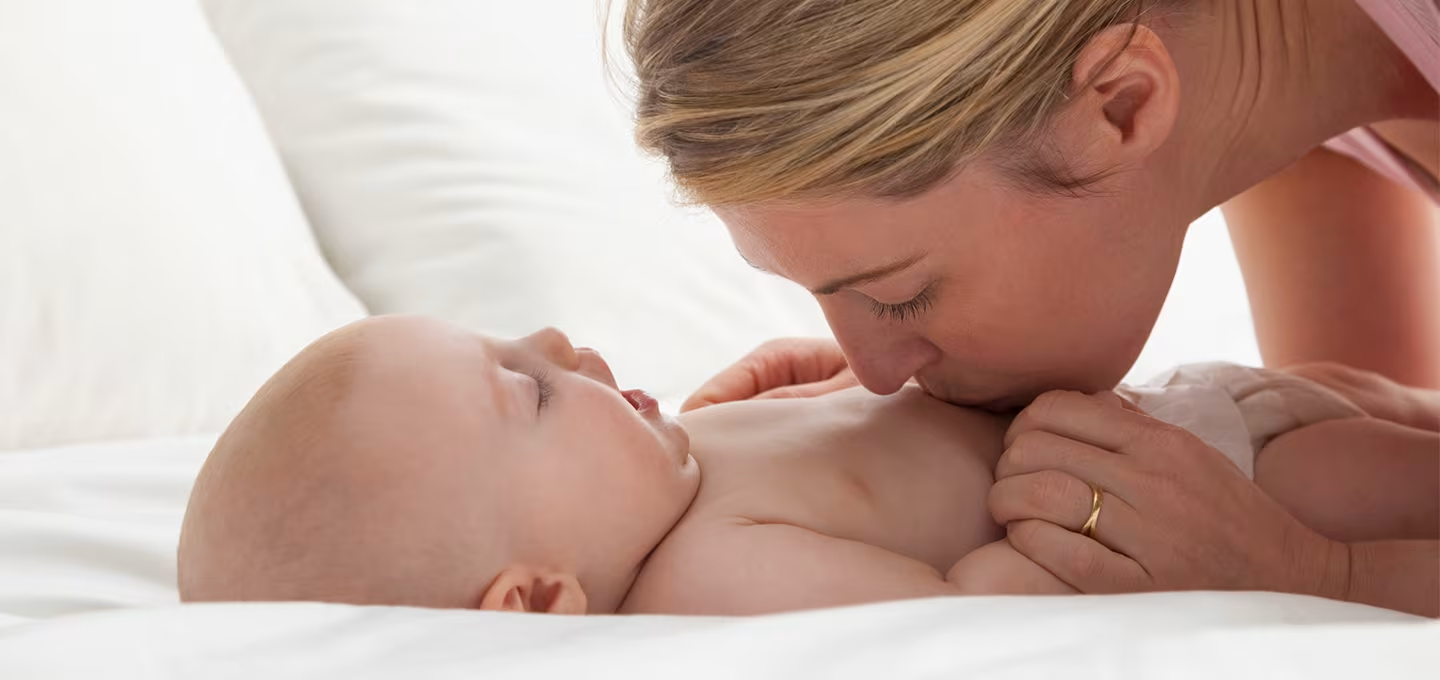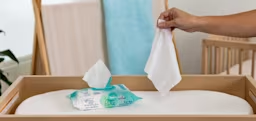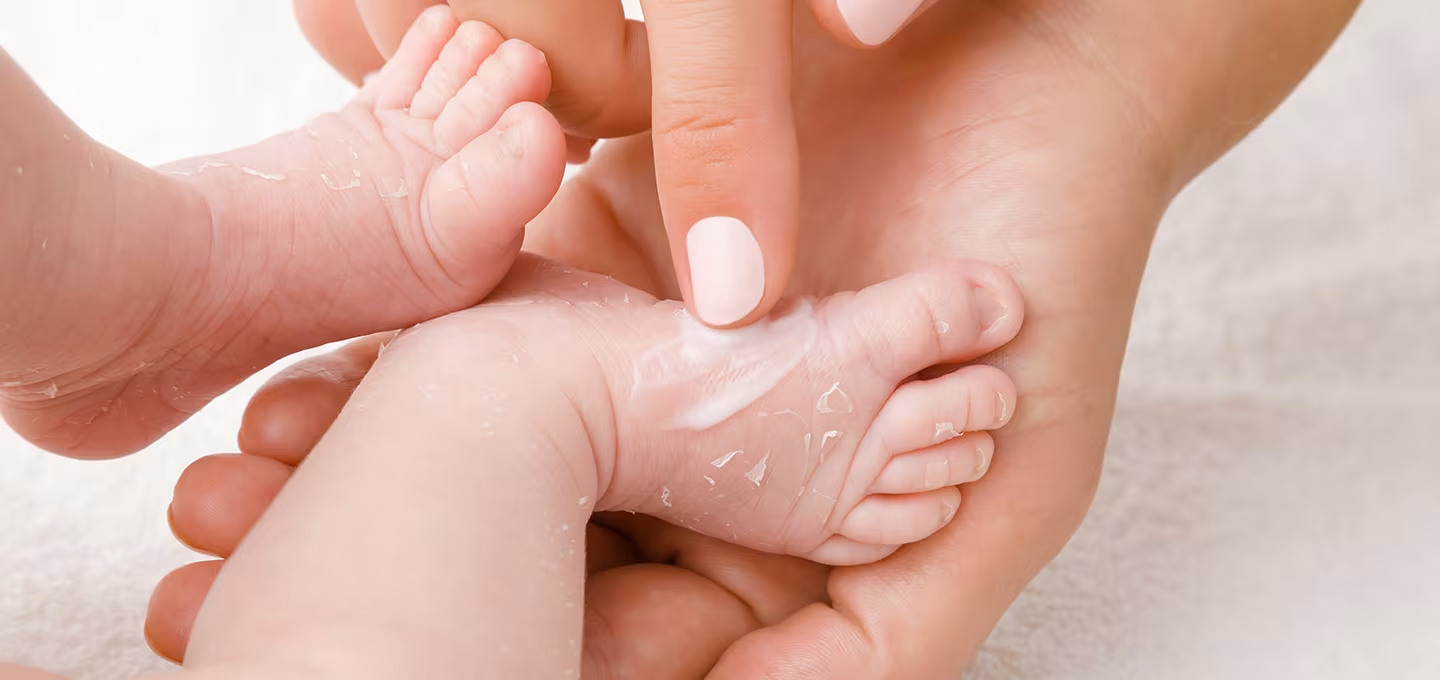
Baby Skin Care: Hygiene, Moisturizing, & Protection


Your little one’s delicate skin needs gentle care to stay soft, healthy, and irritation-free. From newborn hygiene to choosing the right baby skincare products or knowing when to start using lotion on a baby can make all the difference. Read on for expert-backed tips to keep your little one’s skin moisturized, protected, and comfortable.
Soft Touch: Early Baby Skin Care
Your baby's skin may feel incredibly soft, but it’s also a protective barrier that constantly renews itself—even before birth. In the first few days, you might notice redness, peeling, or flaking in newborn skin, especially around the wrists, knees, and feet. This is normal for your baby’s skin as they adjust to the outside world.
It’s also common to see bumps on a newborn’s face, such as baby acne or milia, both harmless conditions that usually fade on their own. More than half of babies will get a rash called Erythema Toxicum, which has red blotches with a small white "pimple" in the center. This rash can be all over the body and is also harmless and will fade on its own. Some babies develop newborn spots on the body, including birthmarks or rashes that typically disappear with time.
For babies with infant skin conditions like skin allergies in newborns, dryness, or irritation, a fragrance-free ointment may help. If a rash worsens or becomes inflamed, consult your baby’s healthcare provider to rule out health problems infants face, such as eczema or skin infections.
With gentle care, your baby’s skin will become softer and smoother as they grow.
Moisturizing Your Baby's Skin
If you're wondering when to start using lotion on a baby, it's generally advisable to wait until after the first few weeks, unless the baby's skin appears very dry. In such cases, applying a small amount of unscented baby moisturizer to the dry areas can be helpful.
Treating Dry Skin
Newborns often experience dry or peeling skin as they adjust to the external environment. To help alleviate dryness:
If your little one's skin remains dry or you notice persistent rough patches, consult your healthcare provider for further guidance.
Baby Development Milestones Watching how your baby grows and develops is an important part of parenthood. Keep track of your little one's progress with our baby development milestones articles!
Newborn Hygiene
Keeping your baby clean is important to their newborn hygiene, but their delicate skin doesn’t need daily baths. In the first few weeks, it’s best to give your little one a sponge bath until their umbilical cord is healed. You want to avoid water in the stump and not pull nor clean it with any other cleaning agents as it may cause infections. After the stump has fallen, and the umbilical cord has healed, you can bathe your baby in a tub or sink. You can read our dedicated article for more on taking care of your newborn’s umbilical cord.
For daily cleansing, knowing how to wash a newborn’s face properly is essential. Use a soft washcloth dipped in warm water to gently wipe their ears, eyes, and nose, avoiding soaps that could irritate their sensitive skin. Keep your little one warm during their sponge bath. Wrap them in a dry towel and only uncover them when you are actively washing a body part.
Always dry your baby’s face with a soft towel after washing to prevent irritation. Continue to gently pat your little one dry and apply a small amount of hypoallergenic moisturizer to prevent eczema or dry skin. By following these simple steps, you can maintain their hygiene while keeping their skin soft and healthy.
Caring for Sensitive Skin
Newborn sensitive skin may be prone to irritation or dryness, requiring extra care to keep it healthy and comfortable.
If you have concerns about your little one's skin or need further guidance, consult your pediatrician.
Baby Sun Protection
Babies of all ages should stay out of direct sunlight, especially, newborn sensitive skin is highly vulnerable to sunburn.
While sunscreen can help in certain situations, protective clothing and shade should be the first line of defense. If your baby shows signs of sunburn or dehydration, such as redness, excessive crying, or fussiness, consult a healthcare provider for further care.
Baby Nail Care
Your little one's nails grow quickly and require regular trimming to prevent scratches.
Here’s how to safely care for them:
By keeping your little one’s nails short and smooth, you can help prevent scratches and keep their delicate skin protected.
Baby Genital Skin Care
Caring for your newborn's genital area is essential for their comfort and health. If your little one has been circumcised, the penis may appear red and swollen, with a yellowish film as it heals. Keep the area clean using warm water after each diaper change, avoiding soap or alcohol-based products that can irritate. Applying a thin layer of petroleum jelly can prevent sticking to the diaper, and your healthcare provider may recommend a gauze dressing for protection. Healing typically takes about a week, but if you notice increased redness, swelling, or discharge, contact your provider.
For uncircumcised babies, gentle cleaning with warm water during baths is sufficient. The foreskin should never be forced back, as it is naturally fused to the glans and will gradually separate on its own, usually by age three to five. If you notice persistent redness, swelling, or discharge, consult your baby's healthcare provider. Keeping the area clean and dry will help prevent irritation and ensure your little one's comfort.
For baby girls, avoid cleaning the vagina or vulva with soap, as it can irritate. Instead, gently wipe the area with warm water and a soft cloth. Be sure to wipe from front to back.
Choosing the right diapers also plays a role in protecting your little one's delicate skin. Pampers Pure diapers are gentle for your baby with ingredients you can trust. They provide superior skin protect by guarding against the four main causes of diaper rash, keeping your baby’s diaper area dry, comfortable, and irritation-free.
Baby Laundry Tips
Your baby’s delicate skin can be sensitive to detergents and fabric chemicals, making proper newborn hygiene essential when washing their clothes. Before your baby wears new outfits or sleeps on fresh linens, wash them to remove potential irritants like dyes or fabric treatments.
For the first few months, it’s best to wash your baby’s clothes separately using a gentle, fragrance-free detergent. Opt for a thorough rinse cycle to ensure no residue is left behind, as leftover soap can lead your newborn’s sensitive skin to react. If your baby develops irritation, consider switching to a hypoallergenic detergent. Keeping clothes, linens, and towels clean and soft helps maintain good newborn hygiene while reducing skin irritation risks.
FAQS AT A GLANCE
A gentle baby skincare routine includes bathing 2–3 times a week, using fragrance-free lotions, and keeping the skin moisturized, after a few weeks. Avoid harsh soaps, and dress your baby in soft, breathable fabrics to prevent irritation.
The Bottom Line
A gentle and consistent baby skincare routine helps keep your little one’s skin soft and healthy. Use mild cleansers, moisturize when needed, and follow proper newborn hygiene to protect their sensitive skin from irritation. Keeping baths short and using fragrance-free products can make a big difference in preventing dryness and discomfort.
As you care for your baby's skin, you can also earn rewards on essentials like diapers and wipes with the Pampers Rewards App. Download the app to unlock exclusive discounts and digital offers on the products you already use.
- American Academy of Pediatrics. Caring for Your Baby and Young Child: Birth to Age 5, 8th ed. Pg. 91-92 (New York: Bantam Books, 2024).
- HealthyChildren.org. "Avoiding Dry Winter Skin in Babies and Toddlers."
- HealthyChildren.org. "Caring For Your Son’s Penis."
- HealthyChildren.org. "Cleaning Baby Clothes."
- HealthyChildren.org. "Make Baby’s Room Safe."
- HealthyChildren.org. "Nail Care: Fingers and Toes."
- HealthyChildren.org. "Sun Safety."
- HealthyChildren.org. "Your Newborn’s Skin: Birthmarks and Rashes."
- Mayo Clinic. "Baby Acne: Diagnosis & Treatment."
- Mayo Clinic. "Baby Eczema: Expert Answers."
- Mayo Clinic. "Healthy Baby: Infant and Toddler Health."
Read more about Baby
Join a World of Support
through Pregnancy and Parenthood.
TRACK WITH TOOLS
LEARN WITH EXPERTS
GET REWARDED








